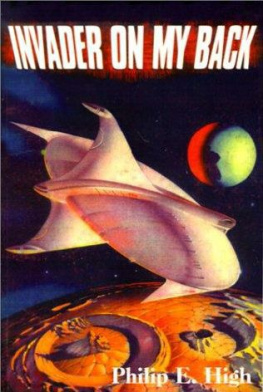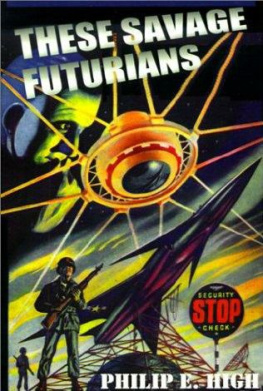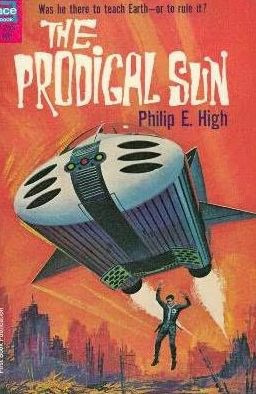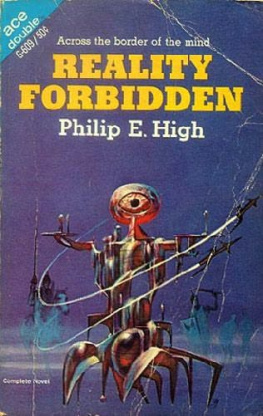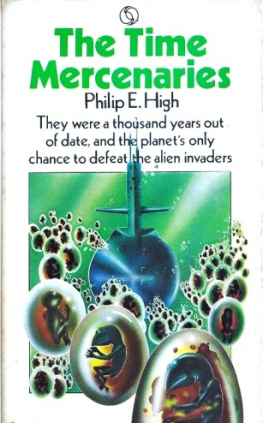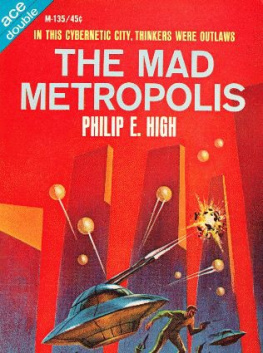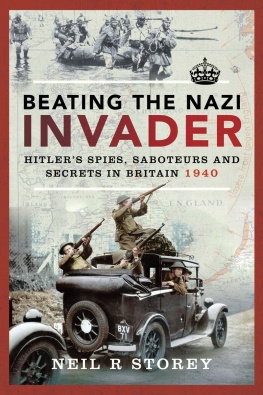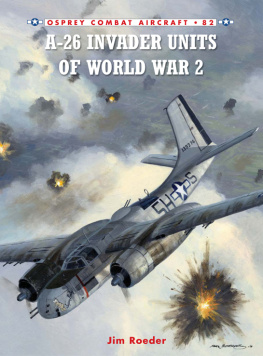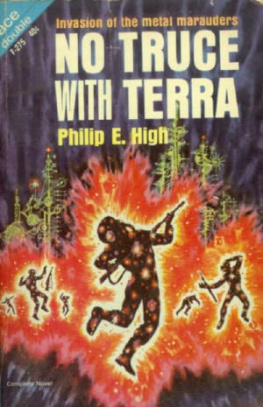Philip E. High
Invader On My Back
Chapter I
THE NORMS had long since moved from the cities; so had the police. Those who remained were jubilant to a degree-it was a pity to lose the police. Cop-killing had been, if not materially rewarding, a considerable boost to prestige. Now they must find other ways of impressing their fellows.
The police themselves, once clear of the cities, formed according to city opinion, an unholy alliance with the Armed Services. Between them, they built enormous forts, reminiscent of the ancient prison camps, which they surrounded with lights, weapons and lethal invisible barriers. Wiseacres asked if the forts had been built to keep the bad elements out or the police in.
Periodically, however, the police made savage punitive raids on the cities-this was when the cities began to get ideas about the Norms.
The Norms, generally speaking, built their rural communities, but a great many people had died in the early days of the Troubles and left room for expansion. Again, only the hubs of the great cities remained. The once sprawling suburbs had long ago been pounded to dust in countless clashes of arms.
Besides rearranging the social structure of the race, the Troubles had also brought about sharp caste divisions which had nothing to do with wealth, heritage, color, creed, or any previously known cultural factor. These new castes were know by commonplace and often slightly vulgar terms of reference.
There were, of course, the police, the Norms, the Scuttlers-every community has its Scuttlers-the Delinks, who could be subdivided into various categories, and the Stinkers.
The Stinkers were few and unique because a Stinker didn't develop into a Stinker until late adolescence. Once developed, he was exceedingly lucky if he survived a year; usually Stinkers ended up in some quiet place with a lot of holes in their backs.
If, however, by good fortune or singular ability, he lived a year, his chances of survival were good. If he lived two years, he would probably die of old age: no one but a madman would try to take an experienced Stinker.
A Stinker learned survival the hard way; it became his stock-in-trade, creed, religion and way of life.
An experienced Stinker developed a sixth sense for ambush, could smell booby traps a mile away and knew more about poison substances than a research laboratory. Usually he surrounded himself with a large variety of subtle and ingenious weapons and could draw faster and shoot quicker than any other living man. Not even a Father-Assassin in one of the cities would consider one:
"A Stinker, Patron! Are you mad? Look, my good friend, to take a Stinker I must use sixty men. Of these sixty men I shall, at a conservative estimate, lose half. If I lose thirty men, I am below survival level, I am vulnerable, I am gunned down by a bigger guild before I can draw breath. However, Patron, rather than appear ungenerous, I will compromise. I will tell you, without charge and in exquisite detail, just what to do with your five million offer"
The police, too, stood clear. The Stinkers never did anything indictable and they killed only in self-defense. Lose a couple of squads picking one up-for what?
The Stinkers, therefore, if they could keep their sanity, which was a hard enough job in itself, lived comparatively untroubled lives. That is, if they could stand being virtual lepers, living like hermits and being actively and violently hated. Stinkers were not called Stinkers for nothing!
Craig was a Stinker, an experienced Stinker and survival-wise to the point of near-clairvoyance. He was also a philosophical thinker and highly intelligent into the bargain.
In his early days he had been almost an infant prodigy and, at fourteen, had majored in cybernetics. At seventeen he had acquired degrees in six sciences and his future had seemed assured.
Regrettably, at the age of eighteen, he began to Stink and his associates, colleagues and odd members of the general public went to considerable lengths to dispose of him.
Perhaps it was his innate genius which saved him; that, coupled with his courage and physical strength.
As soon as he began to notice the growing hostility of those around him, he realized his caste and took precautionary measures. These measures-he had a high degree of technical ability-he improved upon with the passing of time. In truth, they were now the true companions of his isolation, but in those early days they had saved his life many times over.
Now, at the age of thirty-three, Craig was a big man with hairy arms and a brown, sort of unfinished, but not unhandsome, face. He kept his dark hair short and he had the sort of chin which non-Stinkers described as aggressive but in another age would have been called determined. The dark eyes were almost gentle and the mouth sensitive.
Craig did not look like an untouchable and his well-balanced mind had saved him from a sense of persecution. If you were a Stinker, you were a Stinker. You had to accept the fact or go under, because there was not a damn thing you could do about it.
Craig was fortunate in starting with money. He bought equipment, work robots and a deceptively battered-looking flyer which now, thanks to his technical skill, could make a police pursuit ship look as if it were in reverse.
The robots constructed him a comfortable home on an inaccessible mountaintop and with his technical ability and the ship, he traded.
It was a tribute to his ingenuity that he had not only succeeded in creating trade but turned it into a highly lucrative business. All negotiations, prices, requirements and orders had to be conducted in writing. There was no other way; any other form of contact would, but for his reputation, have exploded into violence.
Craig described himself mentally as a "flyer tinker." He was much more than that but there was a basis of truth in the idea. The police always grabbed the best men, and skilled technicians were, therefore, in short supply. Craig went around fixing things, highly technical things, like converter-tubes, Malpras thermonuclear reactors and the highly unstable Bibnal-Siefert energy accumulators.
It was around noon when Craig came in over Tucker's place. Tucker ran a rural general store, replacement office and a small, three-tier autofactory turning out a variety of goods such as furniture, clothing and unflavored food basics. He did quite well out of it, so well that he not only employed men but could afford guns and guards. In consequence, the nearest police fort was, discreetly, just below the horizon. Tucker could afford a limited independence.
Craig gave his usual call sign but did not descend experienced Stinkers took nothing for granted. With instruments, he checked for concentrations of chemical explosives, for the telltale blue spots of programmed booby traps or flick-guns, and the surrounding terrain for concealed sharpshooters.
Tucker sent a recognition signal (recorded) and a list of the things he wanted fixed (also recorded). On the receipt of, Craig's call sign, he and his staff immediately took short-time Comalyzers. Thus, while Craig went about his business, everyone was blissfully out to the world. It had to be that way, since no once could conduct his normal affairs within a hundred yards of a Stinker without becoming hysterical, violent or both.
Craig brought his ship down slowly, still checking and, one hundred and fifty feet from the ground, said, "Reeky, have a look around."
"Yes, sir." There was a plop as Reeky dropped through his special exit lock.
A few seconds later he reported an all clear. "Green, sir, lovely and green."
Craig put the ship down.

